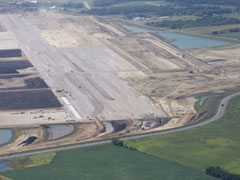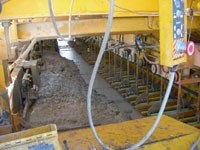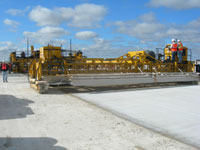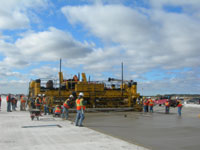 Chicago serves as the nation’s largest rail center. To support the continued growth in the rail and truck transport business throughout the region, Union Pacific constructed the $370 million Joliet Intermodal Terminal located approximately 45 miles southwest of Chicago. The facility not only provided greater container capacity, it also improved rail traffic efficiencies in and around Chicago.
Chicago serves as the nation’s largest rail center. To support the continued growth in the rail and truck transport business throughout the region, Union Pacific constructed the $370 million Joliet Intermodal Terminal located approximately 45 miles southwest of Chicago. The facility not only provided greater container capacity, it also improved rail traffic efficiencies in and around Chicago.
Ragnar Benson Construction, LLC, was the overall designer and served as the general contractor for the project. During the design stage both concrete and asphalt were considered. Hanson Professional Services Inc. prepared the alternate pavement designs for bidding. When the bids were opened, the asphalt cost was slightly lower than concrete, but Union Pacific recognized the long term performance and cost savings with concrete and selected concrete. Concrete will also provide better solar and light reflectance and minimize the impact of heat island effect.
Construction on the site began in August, 2009, and the initial phase was completed in June 2010. Concrete placement began in September, 2009, with 1.043 million square yards or 215 acres of concrete to be placed—equivalent in area to 164 football fields. Concrete thicknesses varied from 8.25 inches for the trailer parking area, 10 inches for the drive aisle pavement, 10.75 inches for the gate area, roads and turning areas, and 16.75 inches for the massive rubber tire gantry craneways. The concrete pavement rested on a 10-inch aggregate base underlain by a 12-inch stabilized subgrade. To match the various slab thicknesses, the design incorporated a smooth, gradual pavement thickness transition over the full slab width.
 D Construction, Inc., the paving contractor, placed the concrete in 30.5-feet-wide alternating lanes. Transverse joints were doweled and sawed at 14 feet. The paver alignment and grade was controlled using total station stringless technology which eliminated the traditional stringlines. The concrete requirements were based on the Illinois Department of Transportation Class PV concrete with a minimum compressive strength of 3,500 pounds per square inch (psi) at 14 days and a minimum flexural strength of 650 psi at 14 days. To assure concrete quality, Terracon Consultants Inc. conducted daily tests on the concrete including air content, slump and temperature. In addition, cylinders were molded in the field at regular intervals for compressive strength testing at three, five, seven and 14 days to verify compliance with the specifications.
D Construction, Inc., the paving contractor, placed the concrete in 30.5-feet-wide alternating lanes. Transverse joints were doweled and sawed at 14 feet. The paver alignment and grade was controlled using total station stringless technology which eliminated the traditional stringlines. The concrete requirements were based on the Illinois Department of Transportation Class PV concrete with a minimum compressive strength of 3,500 pounds per square inch (psi) at 14 days and a minimum flexural strength of 650 psi at 14 days. To assure concrete quality, Terracon Consultants Inc. conducted daily tests on the concrete including air content, slump and temperature. In addition, cylinders were molded in the field at regular intervals for compressive strength testing at three, five, seven and 14 days to verify compliance with the specifications.


Finishing the concrete Curing the concrete
This state-of-the art facility increased annual freight capacity to 500,000 cargo-ship-sized containers and eased the congestion for rail-truck traffic in the Chicago area. By selecting concrete, Union Pacific can look forward to years of excellent pavement performance, low maintenance and uninterrupted operations.